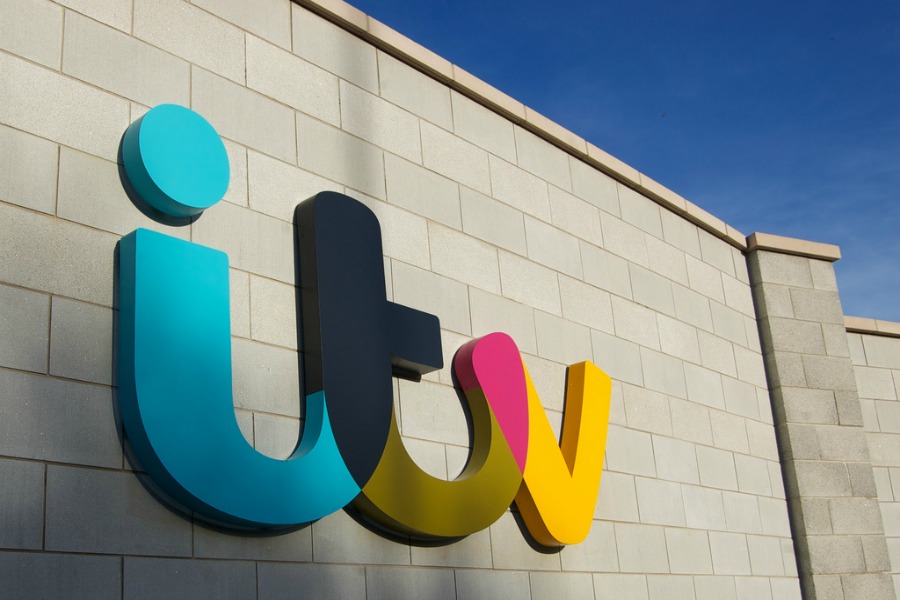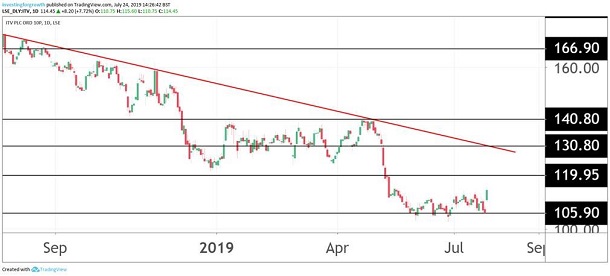ITV prospects brighten after Love Island boost
A Love Island advertising boost has helped high-yielding ITV shares to recover some lost ground.
24th July 2019 14:29
by Graeme Evans from interactive investor
A Love Island advertising boost has helped high-yielding ITV shares to recover some lost ground.

While the prospect of another Love Island on our screens this winter won't fill everyone with joy, ITV (LSE:ITV) investors are unlikely to be complaining too loudly after the current series of the hit reality show helped to bolster the broadcaster’s faltering share price.
CEO Carolyn McCall said total advertising revenues fell 5% in the first half of 2019, which was better than the 6% decline expected in the City. The improvement reflected better-than-expected trading in June after the airing of Love Island on ITV2.
Shares rose 7% to 114p on the back of today's interim results, offsetting a miserable H1 2019 in which the high-yielding stock was among the top 10 worst performers in the FTSE 100 Index.
Unsurprisingly, blame for the 13% first-half fall in share price was laid at the door of Brexit as advertisers have been less willing to commit to an expensive, yet usually successful, outlay. In addition, the period faced some tough comparatives following the 2018 FIFA World Cup.
It's little wonder then that McCall is looking to capitalise on the success of Love Island, which is currently having its best performing series after attracting an average 5.5 million viewers across online and TV. The show delivers an audience share of 18% for ITV2, with the channel the most watched by the all-important 16-34 age bracket for the third year in a row.
To meet this strong demand, there will be two versions of the show in 2020, with the first winter series being filmed in South Africa early next year.
Sentiment around shares has been further boosted in recent days by the release of more details on ITVs BritBox joint venture with the BBC. The new streaming service, which will launch in the autumn at a price of £5.99 a month, is set to focus on archive content from the two broadcasters.

Source: TradingView Past performance is not a guide to future performance
While it won't rival Netflix (NASDAQ:NFLX) for new content, the breadth and depth of quality on offer - particularly in high-end drama where both stations excel and where consumer demand is clear - should provide BritBox with some early momentum.
As for ITV Studios, which is key to ITV being able to offset fluctuations in advertising revenues, the performance in 2019 to date has been in line with expectations. Revenues were 6% lower in the first half, but this should be more than offset by a stronger second half built around a solid pipeline of new and returning shows later this year.
The company expects ITV Studios to deliver revenues growth of at least 5% at a margin of between 14% and 16%, alongside double-digit growth in online revenues. Total advertising revenues are now forecast to be in a range of -1% to +1% in the third quarter, which compares with broker UBS's estimate for a 2% decline.
Another boost for investors came with ITV's decision to maintain the interim dividend at 2.6p and commitment for at least 8p a share over the full year. The company, which trades with a forward yield of 7.5%, added: "The board expects that over the medium term the dividend will grow broadly in line with earnings."
These articles are provided for information purposes only. Occasionally, an opinion about whether to buy or sell a specific investment may be provided by third parties. The content is not intended to be a personal recommendation to buy or sell any financial instrument or product, or to adopt any investment strategy as it is not provided based on an assessment of your investing knowledge and experience, your financial situation or your investment objectives. The value of your investments, and the income derived from them, may go down as well as up. You may not get back all the money that you invest. The investments referred to in this article may not be suitable for all investors, and if in doubt, an investor should seek advice from a qualified investment adviser.
Full performance can be found on the company or index summary page on the interactive investor website. Simply click on the company's or index name highlighted in the article.